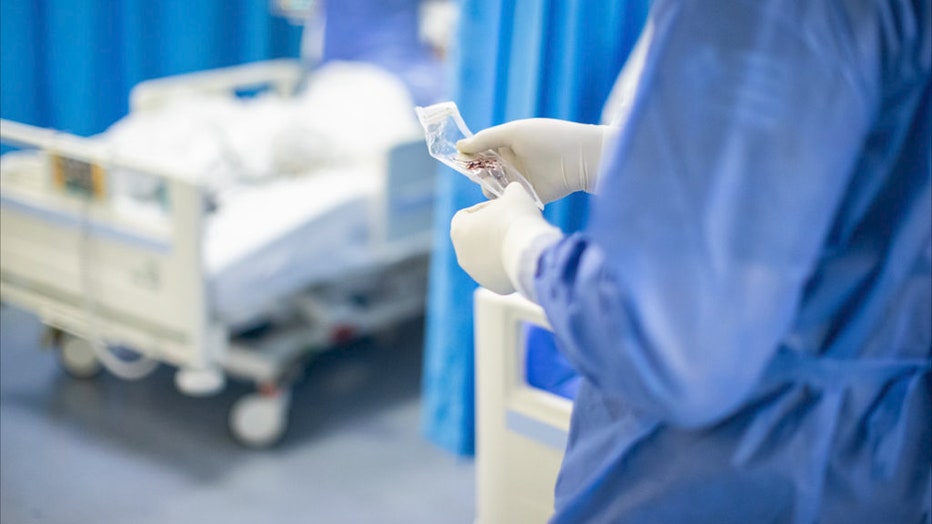NIH launches 3rd trial into blood clot treatments for COVID-19 patients
Researchers at the National Institutes of Health have launched a third trial of treatments for blood clots in COVID-19 patients.
Approximately one year into the COVID-19 pandemic, health experts and scientists are still learning the long and short-term effects this novel virus can have on people who overcome the infection. One of those side effects are blood clots.
Early in the pandemic, doctors found that many of their patients who succumbed to the COVID-19 virus had blood clots throughout their bodies, "including in their smallest blood vessels," according to the NIH.
Having blood clots can lead to other life-threatening effects such as "organ damage to heart attack, stroke, and pulmonary embolism," according to an NIH statement.

FILE - A doctor observes a blood clot expelled by a COVID-19 patient at Hospital General de Mexico on May 30, 2020 in Mexico City, Mexico.
RELATED: Medical imaging shows the true scope of long-term effects caused by COVID-19
The NIH has entered into its third Phase 3 trial of the ACTIV-4 Antithrombotics master protocol for adaptive trials, which tests blood thinner treatments that could potentially help prevent any life-threatening blood clots in discharged adult patients, according to an NIH statement.
This particular trial is part of the Accelerating COVID-19 Therapeutic Interventions and Vaccines (ACTIV) initiative which is "a public-private partnership to develop a coordinated research strategy for prioritizing and speeding development of the most promising treatments and vaccines, " according to the NIH website.
The first patient was enrolled on Feb. 15 and tests are being conducted at more than 100 sites around the world, according to the NIH.
RELATED: Study finds about a third of people with ‘mild’ COVID-19 still have symptoms months later
During this Phase 3 trial, "Eliquis® (apixaban 2.5 mg), a blood thinner, or anticoagulant, donated by Bristol Myers Squibb/Pfizer, is being tested in patients who have been discharged from the hospital following a diagnosis of moderate-to-severe COVID-19," the statement reads.
Researchers will assess patients within 45 days of being hospitalized to see if they "develop any thrombotic complications heart attack, stroke, blood clots in major veins and arteries, deep vein and pulmonary thrombosis, or death."
This NIH trial, which is being overseen by the National Heart, Lung, and Blood Institute, is working in conjunction with Duke University, Durham, North Carolina, University of Pittsburgh; University of Illinois at Chicago; Brigham and Women’s Hospital, Boston; the Medical College of Wisconsin; the University of California, San Francisco; and the University of Ottawa and the Ottawa Hospital Research Institute to conduct this trial.
RELATED: COVID-19 symptoms remained for at least 6 months for some Wuhan patients, study finds
At the onset of the pandemic, doctors and scientists at dozens of hospitals and universities around the globe were seeking answers while trying to measure virus patients’ risks for clots and testing drugs to treat or prevent them.
"COVID-19 is the most thrombotic (clot-producing) disease we’ve ever seen in our lifetime," said Dr. Alex Spyropoulos, a clot specialist and professor at Feinstein Institutes for Medical Research in Manhasset, New York.
Some conditions that make some COVID-19 patients vulnerable to severe complications, including obesity and diabetes, can increase clot risks. But many authorities believe how the virus attacks and the way the body responds both play a role.
Clotting was seen in other coronavirus infections, including SARS, but on a much smaller scale, Spyropoulos said.
Some hospitals have found 40% of deaths in COVID-19 patients are from blood clots. Spyropoulos said that’s been true at his 23-hospital system in the New York City area, Northwell Health, which has treated over 11,000 COVID-19 patients back in May of 2020.
Scientists believe the coronavirus enters the body through enzyme-receptors found throughout the body, including in cells lining the inside of blood vessels. Some theorize that it may promote clotting by somehow injuring those vessels as it spreads. That injury may cause a severe immune response as the body tries to fight the infection, resulting in inflammation that may also damage vessels and promote clotting, said Dr. Valentin Fuster, director of Mount Sinai Heart hospital in New York.
The Associated Press contributed to this report.


